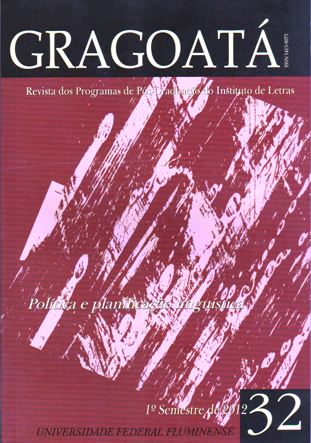Teaching through Research: the university for the Latin American diversity
DOI:
https://doi.org/10.22409/gragoata.v17i32.33036Keywords:
Teaching through Research, MERCOSUR Frontier Intercultural Bilingual Schools Project, Indigenous Graduation, Cultural and Linguistic Diversity, Linguistic PoliticsAbstract
To rethink the university facing to the cultural and linguistic diversity present in Latin American countries, we must consider not only intra- -national cases, but also the diversity between the countries themselves. That need arises from the establishment, by MERCOSUL, of some integration politics facing the education sector, covering both the Basic Education and Higher Education. Thus, the MERCOSUR Frontier Intercultural Bilingual Schools Project (PEIBF) and the thematic blocks of the Education Sector of MERCOSUR for Higher Education, namely, recognition, mobility and Inter-institutional cooperation, present themselves as instigators of reflections on how to cover classroom diversity in Latin American educational institutions of member countries. If the requirement of consideration is put, the way Education can work with and for the cultural and linguistic diversity, both in the intra and the inter-national cases, is still being defined. One of those ways is Teaching through Research. But why the Teaching through Research can be considered one of the instruments for the redefinition of the university and schools of the twenty-first century inserting them in a framework of valuing cultural and linguistic diversity? Aiming to answer this question, the work was organized to present the method “Teaching through Research” to then present two contexts in which it is adopted. One of these contexts uses the Teaching through Research for intra-national Latin American diversity, that of the native peoples. The other context encompasses the inter-national Latin American diversity, that between the MERCOSUR countries.
Downloads
Downloads
Published
How to Cite
Issue
Section
License
Authors who publish in Gragoatá agree to the following terms:
The authors retain the rights and give the journal the right to the first publication, simultaneously subject to a Creative Commons license CC-BY-NC 4.0, which allows sharing by third parties with due mention to the author and the first publication by Gragoatá.
Authors may enter into additional and separate contractual arrangements for the non-exclusive distribution of the published version of the work (for example, posting it in an institutional repository or publishing it in a book), with recognition of its initial publication in Gragoatá.

Gragoatá is licensed under a Creative Commons - Attribution-NonCommercial 4.0 International.











